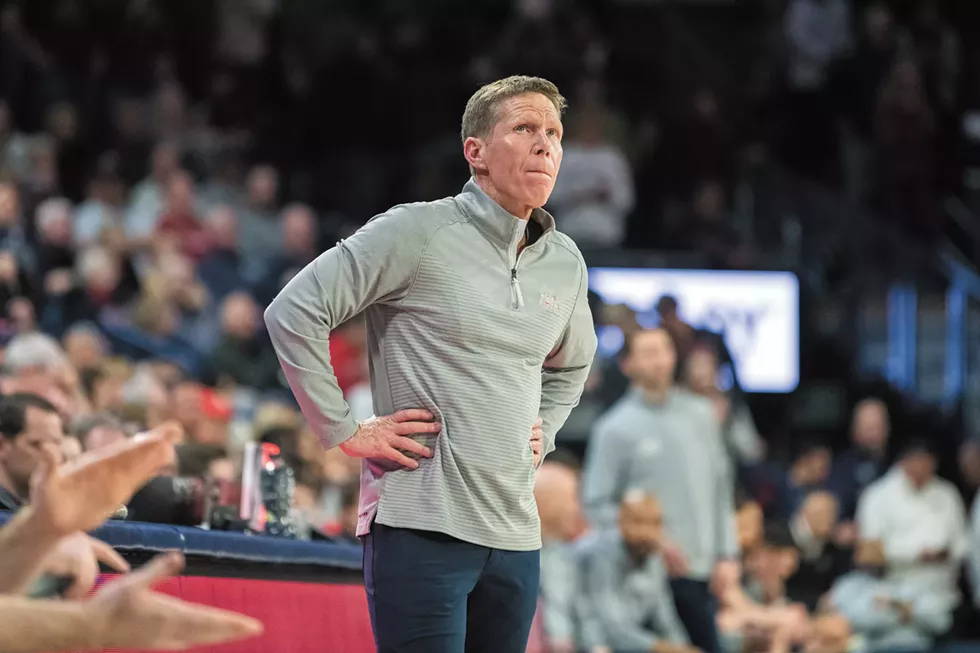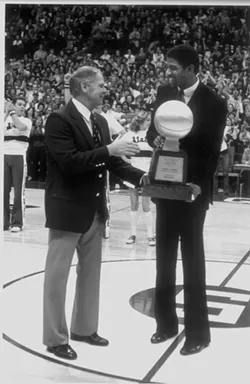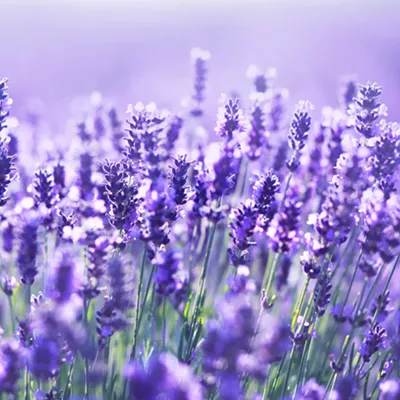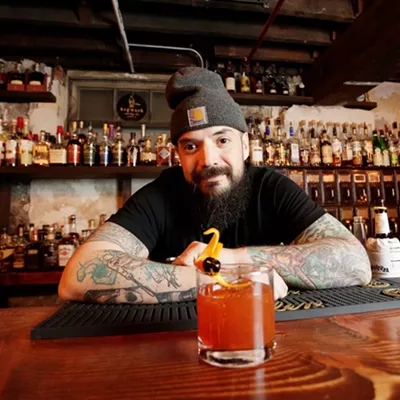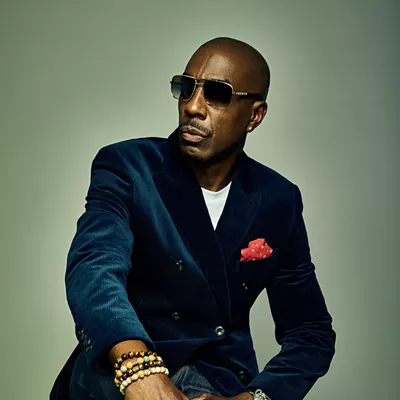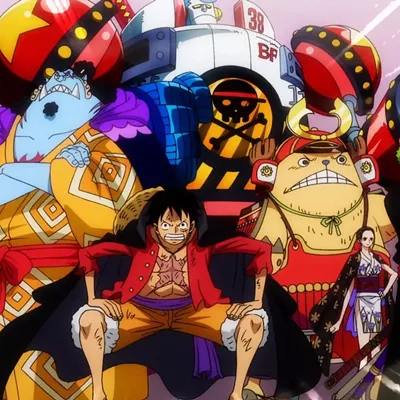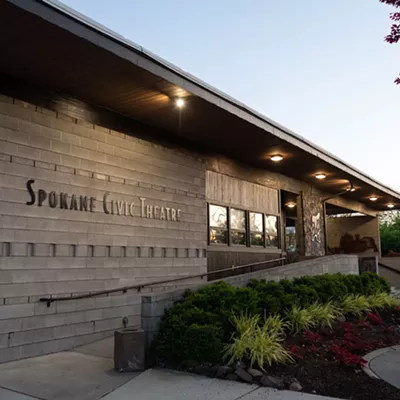
Spokane may not be the "Mecca of Basketball" as New York City is often called, but the Inland Northwest's rich hoops history more than justifies our city's moniker of Hooptown USA.
Everybody here knows about Hoopfest, the world's largest 3-on-3 basketball tournament that takes over the streets of downtown Spokane this weekend. Same goes for Gonzaga men's basketball, which has been among college sport's elite for over two decades. Those are the most visible aspects of Spokane's basketball culture, but they're just the tip of the iceberg.
It's underneath the surface — where top-shelf coaches share their wisdom in the high school gyms packed with talent and on the playgrounds where local legends display the pure joy of the game — that Spokane's credentials as a true basketball town are bolstered and burnished.
THE COACHING TREE
Mark Few, Tommy Lloyd, Ray Giacoletti and Jerry Krause at the college level. Jim Redmon, Freddie Rehkow and Glenn Williams in the high schools. They're names that younger generations would be familiar with, but they're just the latest coaches carrying the mantle here in Spokane.
Just ask ESPN's Neil Everett.
"Spokane's had some really good coaches. Squinty Hunter at Lewis and Clark, Dave Robertson at Shadle are I think the two greatest. And then, you know, the college coaches at Gonzaga," says Everett, a Lewis and Clark High grad who spent 23 years on-air at the worldwide leader in sports. "That's a great coaching tree."
One name that can't be left off the list is a Hall of Famer who got the job done at both the high school and collegiate levels.
Jud Heathcote, the rock of West Valley basketball throughout the 1950s and '60s, spent 14 seasons coaching and teaching in Millwood. From there, he moved on to Washington State and Montana before finding Magic (Johnson) at Michigan State.
After two decades and a national championship (1979) with the Spartans, Heathcote retired in 1995 and moved back to Spokane. It wasn't just the city where he cut his teeth at West Valley High, but also where he met his wife, Beverly.
Heathcote quickly became a fixture at an up-and-coming college basketball program that few outside the region could properly pronounce: Gonzaga.
"Having Jud in the stands as a season ticket holder was just a great image for us as a basketball program," says Mike Roth, the former longtime athletic director at Gonzaga.
More than just a fan in the stands, Heathcote became a mentor to the young Gonzaga coaching staff of the late '90s and early 2000s. The weekly lunch meetings at Jack and Dan's between Heathcote and the Zag coaches became such a staple that one was included as the opening segment of a three-part ESPN documentary on GU hoops called The Season.
"He really helped in those early stages with the credibility of Gonzaga basketball," says Roth.
One of Spokane's coaching legends wasn't even drawing up plays for a specific team. Fred Crowell reached more players than any Spokaneite by founding NBC Camps in 1971.What started with 108 boys in rural Cusick, Washington, has grown into a multinational organization teaching about 11,000 kids per year.
Despite the growth, NBC Camps is still a family affair based in Spokane.
"[Fred] was just bigger than life, loved people and had tons of energy, lots of joy, and a real passion for teaching basketball," says Jennifer Ferch, Crowell's daughter and current chief operating officer of NBC Camps. "He had a real huge heart for the underdog, too. He loved those kids, and he wanted to give them skill sets."
Crowell coached well into his 70s, even as he spent his final 12 years battling cancer. He will be honored as a member of this year's class of the Hooptown Hall of Fame as part of Hoopfest.
GIRLS GOT GAME
March 31, 2018. That's when an ESPN television audience learned something that high school basketball fans from Washington had known for decades: Spokane is home to some amazing, under-the-radar girls basketball.
That was the day Central Valley completed an undefeated, 29-0 season by upsetting the top-ranked girls high school team in the country to win the national championship.
The squad was led by Lacie and Lexie Hull and a swath of other future Division I college ballers. The Hull sisters followed up their high school national championship with a collegiate championship for the powerhouse Stanford Cardinal in 2021. The following year, Lexie would be picked 6th overall in the WNBA Draft.
Those Bears teams of the late 2010s were just the latest in a long line of exceptional girls basketball programs to emerge from the Greater Spokane League. Spokane-area teams have won 18 of the past 35 4A state championships.
"When I took our team [to state] in 2012 and we came in second... I felt like I had let down the GSL because we didn't complete the task when most of the GSL had," says Freddie Rehkow, the former coach at Central Valley.

Shadle Park brought the region its first 4A title in 1988, defeating local rivals Lewis and Clark in the championship game. Shadle would go back-to-back with another title in 1989.
Mead followed that pioneering Shadle team's lead, making three straight title games from 1990-92 and winning two. The Panthers would win another just four seasons later with future WNBA point guard and current Gonzaga assistant, Stacy Clinesmith, leading the way.
Central Valley was the next dynasty from Spokane, with three straight trips to the championship game from 2000-03 resulting in a pair of titles.
Lewis and Clark managed to do one better, with back-to-back-to-back championships from 2006-08, and another in 2011. The foundation for that run of titles was laid down by Briann January, who played at LC from 2002 through 2005. The culture she helped build would lead LC to the promised land and propel her to Arizona State University and a 14-year WNBA career.
The players who followed January at LC included multiple future high-level college players, including another future WNBA player in Katelan Redmon. Heather Bowman would go on to set the Gonzaga women's record for career points scored.
Another future WNBA player, Angie Bjorklund, was leading Spokane Valley's University High at the time of LC's run.
Gonzaga Prep won a pair of titles in 2014 and 2015, which were bookended by championships from Mead in 2013 and the start of Central Valley's second dynasty in 2016.
Between 2016 and 2020, Central Valley won three state championships and the region's first national title. From 2016 through 2018 the Bears won 83 games and lost just once.
Now, with the winning Gonzaga women's basketball team, there's a steady stream of top talent coming to play in front of big crowds in Spokane, carrying on the tradition.
"It starts with the youth programs," Rehkow says of the abundance of girls basketball talent here in Spokane. "We have a lot of those young ladies who went through the youth programs, or AAU, and you have Hoopfest, which a lot of the kids grew up playing."
PANDEMONIUM AND PROTEST
On the boys' side, Spokane area high school teams haven't fared quite as well. Sure, Gonzaga Prep won three state championships during the 2010s (including two straight in 2018 and 2019) and Ferris won a pair in 2007 and 2008, but beyond that, there's not much to show.
In the 100-year history of the state tournament, Spokane teams have claimed just 14 4A titles.
Success at the 4A level has been found overwhelmingly by teams from the talent-laden areas around Seattle and in the Portland suburbs of southwestern Washington.
That's not to say there haven't been some dominant teams or memorable moments.
Lewis and Clark was led by E. L. "Squinty" Hunter for 39 years, from the 1920s into the '60s. From 1933 through 1944, Hunter's Tigers were the undisputed giants of Spokane basketball, winning the city league for 12 consecutive seasons.
At the state level, however, they managed just one tournament championship during that run. Under Hunter, LC would win two other titles, one in 1926 and another in 1949.
Spokane's boys may lack the historic dominance and dynastic runs at the state level found on the girls' side, but they gave us one iconic moment that trumps all others in Washington high school basketball history.
It was the 1981 state championship game. A classic cross-state showdown. Mercer Island versus Shadle Park, led by future Super Bowl MVP Mark Rypien.
It ended with pandemonium, protest and probation. For those of a certain age, the winning team isn't necessarily the one that took home the trophy, but rather the one from your side of the Cascades.
"I was at that game. I was a freshman in college, and I drove up to Seattle to watch," says ESPN's Everett, whose stepfather Dave Robertson was the coach at Shadle Park.
With just seconds left to play, Mercer Island took a 1-point lead at the free throw line. Shadle hurried up the court, and the ball found its way to Greg Schmidt on the block. He caught it and shot it in one motion.
The horn that would normally go off automatically when the clock reaches zero malfunctioned.
Schmidt's shot went in, but the Mercer Island players thought it was late and began to celebrate. Their band rushed the court. In the commotion, however, the officiating crew signaled that the shot counted. Shadle Park 66, Mercer Island 65.
After a moment of confusion, the celebration swung from one side of the arena to the other.
"Years later I got video of that game and of that finish. That was back before the basket would turn red, and back before they had video replay," says Everett. "We looked at that video — it wasn't just me, this was at ESPN — the folks who looked at the video with me said the shot looked to be good. We took it down frame-by-frame, and it appeared that the ball left his hand before the buzzer went off."
Mercer Island would not return home empty-handed, though their reward certainly wasn't a championship trophy. The state's interscholastic athletics association slapped the program with probation for unsportsmanlike conduct after the game.
LOCAL COURTS AND LEGENDS
Spokane is a city of parks and by extension a city of playground hoops.
"Whoever's in charge of the courts [at Riverfront Park], I think they should do more" courts like those, says DaShawn Bedford, a filmmaker and former Spokane Community College player. The Spokane Hoopfest Association is responsible for the new courts in Riverfront Park, and they certainly are doing more.
There are no better outdoor courts in the Inland Northwest than the 30-plus that Hoopfest has built and maintained over its three decades in Spokane.
They're hotbeds for playground pickup games now, much like courts in West Central or Chief Garry Park were back in the day.
They're where you might find the next local legend. The next "Step Back" Bobby Jack Sumler, a standout player at Lewis and Clark and Spokane Community College in the late '70s and early '80s. His legend was cemented on playground courts and gyms around the city.
"...one day someone's like, 'Did you hear [Neil Everett] call Bobby Jack's name out?"
"Let's just say he didn't look like your typical ball player. Everybody else was geared up in UNLV, Duke, Michigan [merch]. If you didn't have that gear, that look, can you really play?" recalls DaShawn Bedford.
"Those who know, know," says Everett. "Bobby Jack was as good a baller as any that ran the courts in those days. He had the wingspan of a Marvel character. The 3-point line wasn't around back then, but if the 3-point line was in play back then, it would've been all over.
"The first Spokane Hall of Fame was John Stockton, Bobby Jack," Everett adds regarding the 2021 Hooptown USA Hall of Fame class. "To be in that initial class and to be grouped with a guy like Stockton, who's one of the greatest NBA players ever, it shows you what a legend Bobby Jack was. Sometimes a legend doesn't live up to the truth, but for Bobby Jack it does."
While he's still teaching kids the game of basketball here in Spokane, the legend of Bobby Jack lives on nationally as well, in part thanks to Everett's role at ESPN.
"I never really knew he had a national presence until one day someone's like, 'Did you hear [Everett] call Bobby Jack's name out?" Bedford recalls. "He's like, 'Step Back Bobby Jack, from the Dick's parking lot!'"
The catchphrase became a regular of Everett's when doing NBA highlights on ESPN's SportsCenter.
"He was just a guy that you couldn't help but love. I'm really blessed to call Bobby Jack a friend," says Everett, echoing a sentiment you'll hear from anyone who knows the man behind the legend.
And who knows? The next Spokane basketball legend may be taking the court this weekend. ♦

